Publications
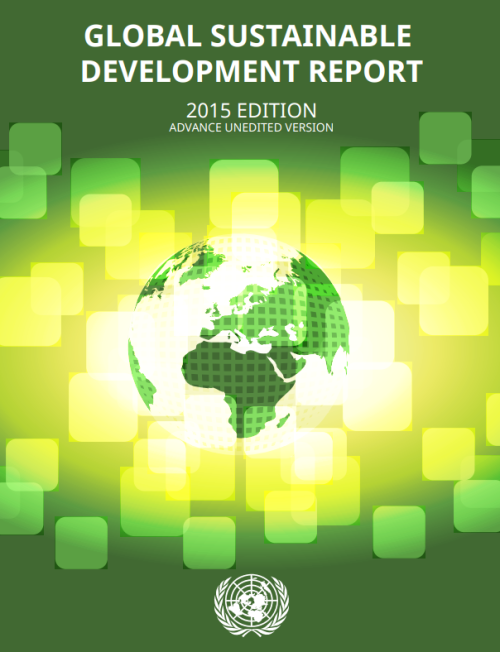
A new United Nations flagship report launched today finds that solutions to the challenges to people and planet must build on clear scientific findings in order to be sustainable. “The successful implementation of the new sustainable development agenda requires a strong scientific foundation that is understood by policymakers,” said Wu Hongbo, UN DESA’s Under-Secretary-General, referring to the proposed 17 sustainable development goals, scheduled for adoption in September in New York.
The 2015 Global Sustainable Development Report, an intergovernmental-mandated report on the science-policy interface for sustainable development, was presented to UN Member States at the High…
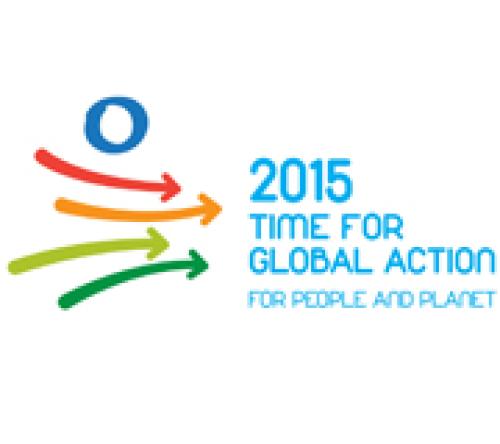
Calling for inclusive, agile and coordinated action to usher in an era of sustainable development for all, Secretary-General Ban Ki-moon on 4 December presented the UN General Assembly with an advance unedited version of his “synthesis report,” which will guide negotiations for a new global agenda centred on people and the planet, and underpinned by human rights. The report was formally issued in the six official UN languages on 31 December 2014.
“Next year, 2015, will herald an unprecedented opportunity to take far-reaching, long-overdue global action to secure our future well-being,” Mr. Ban said as he called on Member States to be “innovative,…
Millions of people’s lives have improved due to concerted global, regional, national and local efforts to achieve the Millennium Development Goals (MDGs), which serve as the foundation for the next global development agenda, according to the report launched by the Secretary-General on 7 July 2014.
With many MDG targets already met on reducing poverty, increasing access to improved drinking water sources, improving the lives of slum dwellers and achieving gender parity in primary school, the report says many more targets are within reach by their 2015 target date. If trends continue, the world will surpass MDG targets on malaria, tuberculosis and access to HIV treatment, and the…

The objective of the Madrid International Plan of Action on Ageing (MIPAA) was the elimination of all forms of neglect, abuse and violence against older persons (MIPAA, 2002).
The United Nations Department of Economic and Social Affairs (UN-DESA), together with its focal point on ageing in the Division for Social Policy and Development (DSPD), began a discussion based on current research, available data and the terminology used in academic circles to describe and classify violence and abuse against older women. The majority of academic research and discourse has been conducted in developed countries, and agreement on terminology and meanings has—by no means—been clear or agreed.…
The experience from the Millennium Development Goals has shown that well-defined, objectively measurable indicators can help to maintain focus on internationally agreed development goals and targets, while keeping the world informed of achievements, problem areas and emerging issues.
Looking ahead to the post-2015 development agenda, it will be important to develop a robust monitoring system that draws on traditional data collection methods and innovations in statistics and data collection to develop a monitoring framework that can measure progress on the various thematic areas.
While it is still too early to define a set of indicators and targets for the development…
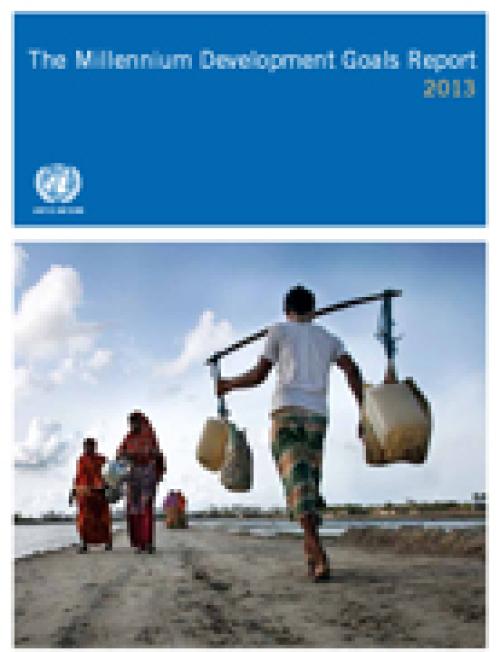
“The Millennium Development Goals have been the most successful global anti-poverty push in history,” Mr. Ban said. “The MDGs have proven that focused global…
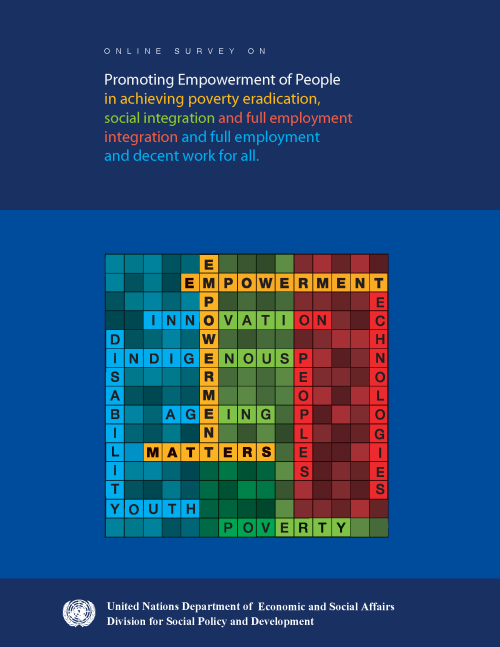
UNDESA-DSPD, from 8 August to 5 September 2012, conducted a global online survey to gather inputs for consideration by the 51st session of the Commission for Social Development (CSocD), which took place from 6 to 15 February 2013.
The survey enabled the public worldwide to respond to a set of questions that were related to the priority theme of CSocD on “Promoting empowerment of people in achieving poverty eradication, social integration and full employment and decent work for all”.
The responses collected and selected from the first question “Empowerment: What does it mean to you?” was published in a separate booklet.
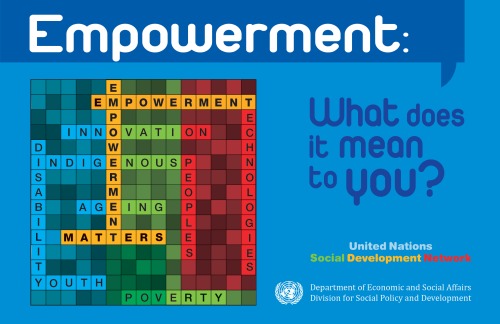
The “Definitions of Empowerment” represents a collaborative effort, made possible by the answers received from people all over the world on the Empowerment theme. Their invaluable contributions were essential for the preparation of the Empowerment Publication.
In order to collect people’s ideas and experiences, the Division for Social Policy and Development (DSPD) of UNDESA launched an on-line survey on “Promoting Empowerment of People”.
We were glad to receive tens and tens of responses from young individuals, persons with disabilities, older persons, and people working for various institutions and organizations committed to social development issues. Their keen interest…
The report presents the yearly assessment of global progress towards the MDGs, highlighting several milestones – three important MDG targets have been met well ahead of the target date of 2015. The report says that meeting the remaining targets, while challenging, remain possible – but only if Governments do not waiver from their commitments made over a decade ago.
Based on a master set of data compiled by the Inter-Agency and Expert Group on MDG indicators led by DESA’s Statistics Division, the 2012 report outlines gains in poverty reduction and access to safe drinking water, and an improvement in the lives of slums dwellers in urban areas. The report also highlights important…
The Demographic Yearbook 2009-2010 is the sixty-first in a series published by the United Nations since 1948. It contains tables including a world summary of selected demographic statistics, statistics on the size, distribution and trends in national populations, fertility, foetal mortality, infant and maternal mortality, general mortality, nuptiality and divorce. Data are shown by urban/rural residence, as available. In addition, the volume provides Technical Notes, a synoptic table, a historical index and a listing of the issues of the Demographic Yearbook published to date.
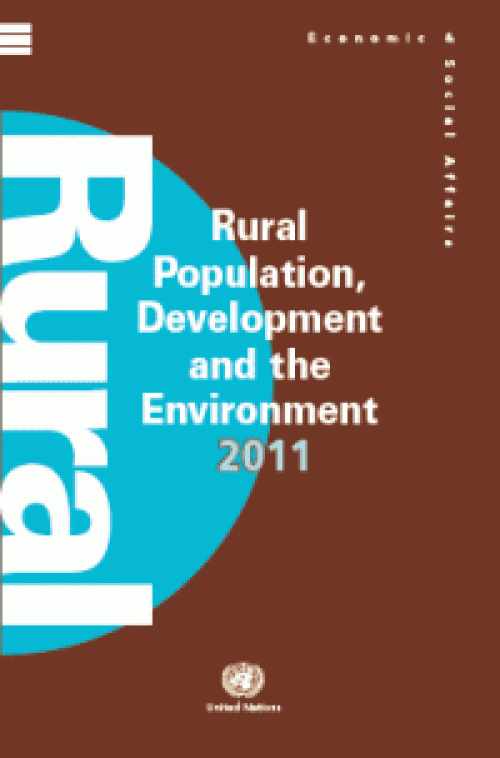
UN Population Division's wall chart on Rural Population, Development and the Environment 2011 presents the latest data available for 15 indicators of rural population, land use, development and environment. It provides estimates at the national, regional and world levels, giving us a better understanding of the relationship between demographic dynamics, natural resources and cultural practices.
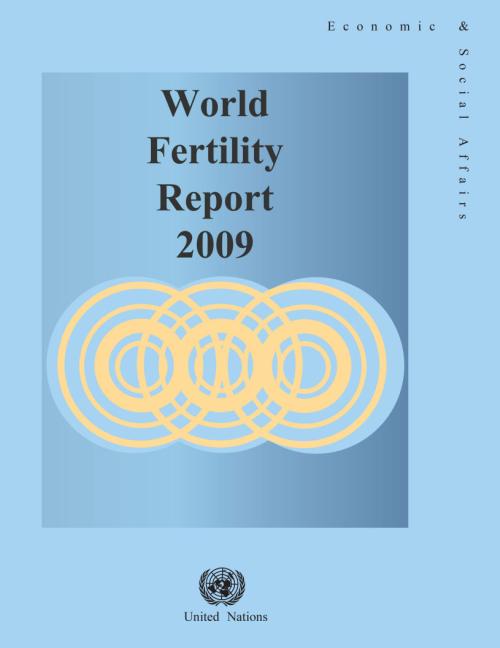
This report, published by the Population Division, is the third in the series of the analysis of reproductive behaviour worldwide. It discusses levels and trends of fertility, the timing of childbearing, marriage, contraceptive use and national policies with respect to fertility and childbearing for 196 countries or areas. The data presented are obtained from civil registration statistics, population censuses and nationally representative sample surveys.
 Welcome to the United Nations
Welcome to the United Nations